Based on Your Reading:
Get Your Free Mesothelioma Guide

Find a Top Mesothelioma Doctor

Access Help Paying for Treatment

The most common mesothelioma symptoms are fluid buildup and swelling, fatigue, pain and weight loss for all types of the disease. Common pleural mesothelioma symptoms include shortness of breath and chronic cough. Peritoneal patients commonly experience loss of appetite, nausea and vomiting.
Written by Karen Selby, RN | Medically Reviewed By Dr. Jacques Fontaine | Edited By Walter Pacheco
The Mesothelioma Center at Asbestos.com has provided patients and their loved ones the most updated and reliable information on mesothelioma and asbestos exposure since 2006.
Our team of Patient Advocates includes a medical doctor, a registered nurse, health services administrators, veterans, VA-accredited Claims Agents, an oncology patient navigator and hospice care expert. Their combined expertise means we help any mesothelioma patient or loved one through every step of their cancer journey.
More than 30 contributors, including mesothelioma doctors, survivors, health care professionals and other experts, have peer-reviewed our website and written unique research-driven articles to ensure you get the highest-quality medical and health information.
My family has only the highest compliment for the assistance and support that we received from The Mesothelioma Center. This is a staff of compassionate and knowledgeable individuals who respect what your family is experiencing and who go the extra mile to make an unfortunate diagnosis less stressful. Information and assistance were provided by The Mesothelioma Center at no cost to our family.LashawnMesothelioma patient’s daughter


Selby, K. (2024, May 15). Mesothelioma Symptoms. Asbestos.com. Retrieved May 16, 2024, from https://www.asbestos.com/mesothelioma/symptoms/
Selby, Karen. "Mesothelioma Symptoms." Asbestos.com, 15 May 2024, https://www.asbestos.com/mesothelioma/symptoms/.
Selby, Karen. "Mesothelioma Symptoms." Asbestos.com. Last modified May 15, 2024. https://www.asbestos.com/mesothelioma/symptoms/.
The most common mesothelioma symptom is pleural effusion, occurring in 90% of patients. Because pleural mesothelioma is the most common type of the disease, many reported symptoms are respiratory. All mesothelioma types share common symptoms, such as fatigue, pain and weight loss.
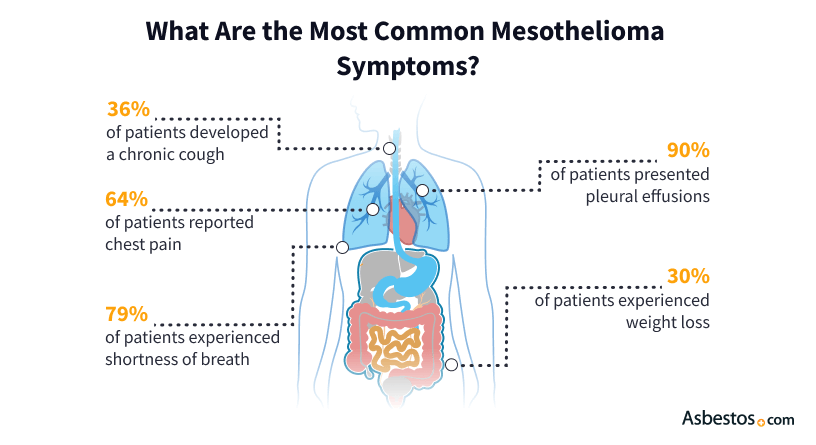
Many symptoms don’t appear until later stages, making mesothelioma diagnosis challenging. Early signs of pleural mesothelioma include a dry, persistent cough and shortness of breath. Some peritoneal patients may have nausea, constipation or diarrhea. Symptoms of mesothelioma can vary based on cancer stage and tumor location.
Discuss any history of asbestos exposure, the primary cause of mesothelioma, with your doctor. They may recommend regular mesothelioma screenings and can arrange them for you. Statistics indicate early intervention improves life expectancy.
Pleural mesothelioma forms on the soft tissue lining the outside of the lungs. Irritation of the pleura from asbestos fibers can cause thickening, pleural plaques and fluid buildup in the pleural space.
Pleural thickening and plaques can make the lungs stiffer. Pleural effusion can be painful and prevent lung expansion, making breathing more difficult. Pleural effusion is often the first sign of pleural mesothelioma. Symptoms of pleural mesothelioma typically affect the lungs but also impact the body as a whole.
“Many oncologists, primary care providers and even pulmonologists don’t realize that a pleural effusion or shortness of breath and pain could be mesothelioma because it is so rare,” Dr. Jeffrey Velotta, a cardiothoracic surgeon at Kaiser Permanente, told The Mesothelioma Center. “If they know what to look for, they can refer patients to mesothelioma specialists.”
The Mesothelioma Center, which works with more than 50% of all mesothelioma patients diagnosed each year, conducted a survey of pleural mesothelioma survivors. When asked about their most common symptoms, most respondents reported experiencing symptoms often mistaken for other conditions, such as chest pain and shortness of breath.
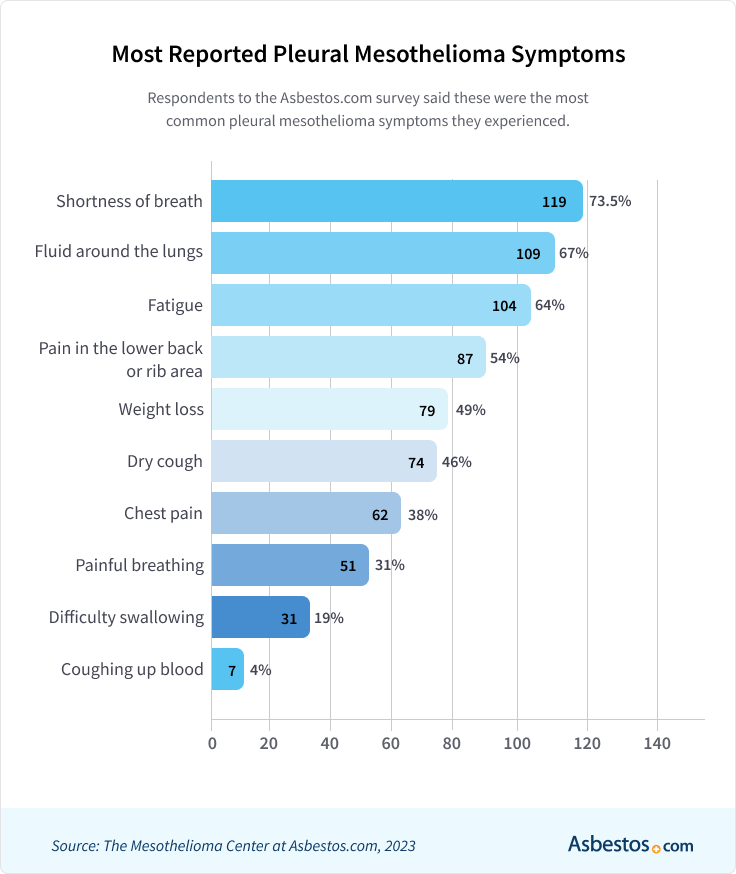
“Most commonly, patients present with cough, shortness of breath, difficulty in walking and loss of stamina,” Dr. Marcelo DaSilva, chief of thoracic surgery and medical director at AdventHealth Cancer Institute, told The Mesothelioma Center.
Get Your Free Mesothelioma Guide

Find a Top Mesothelioma Doctor

Access Help Paying for Treatment

Peritoneal mesothelioma commonly causes abdominal and digestive symptoms, but it can also affect breathing and cause systemic symptoms throughout the body. Tumors in the abdomen can also cause bloating, pain, diarrhea, constipation and bowel obstruction.
Peritoneal mesothelioma develops on the soft tissue that lines the abdominal cavity and organs. This can cause excess fluid accumulation in the abdominal cavity. This condition is called ascites.
In The Mesothelioma Center’s exclusive survey, most peritoneal mesothelioma respondents reported symptoms often initially confused with many other conditions, such as Crohn’s disease, ulcerative colitis and liver disease. Abdominal pain was the most common peritoneal mesothelioma symptom among our survey respondents with 74% of patients reporting it.
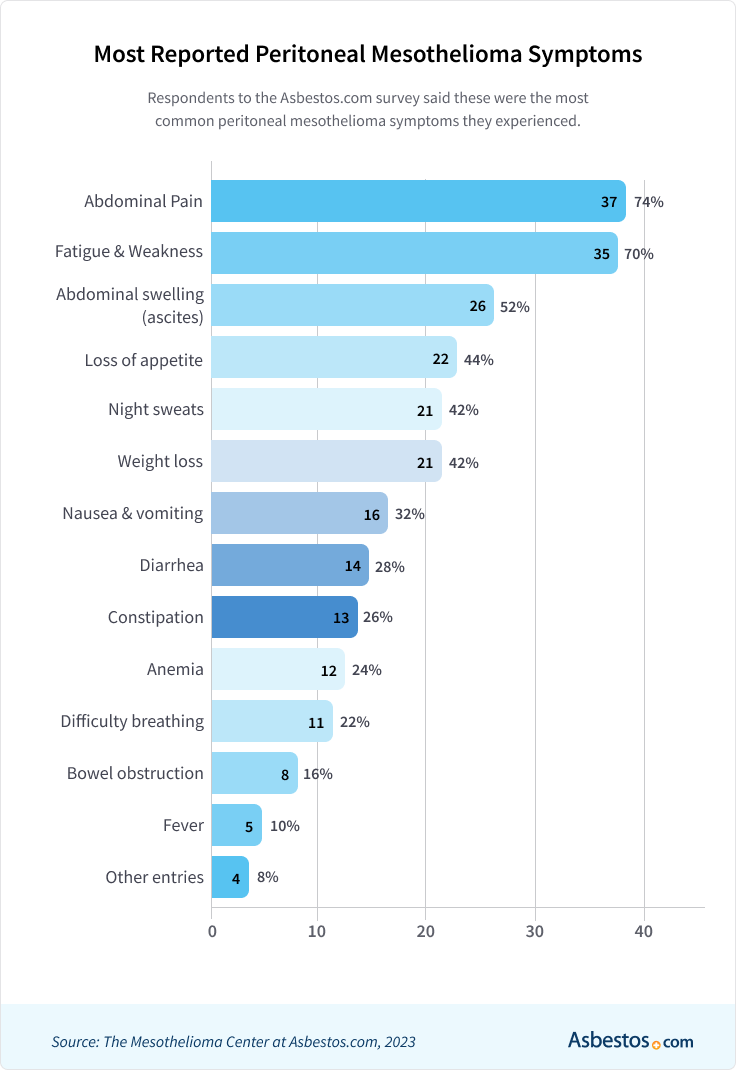
“I began to feel slight discomfort in the upper abdominal area,” peritoneal mesothelioma survivor Kasie Coleman told The Mesothelioma Center. “My family practitioner said I’d probably bruised a rib, but 7 months later I could hardly stand.”
Coleman spent nearly 2 years with persistent and worsening symptoms, including abdominal fluid and extreme pain, because of a misdiagnosis. When she underwent hernia surgery, doctors found a mass and confirmed her peritoneal mesothelioma diagnosis.
Symptoms of pericardial mesothelioma primarily affect the heart and can also affect breathing. Mesothelioma causes the layer of mesothelial tissue that forms a sac around the heart (the pericardium) to thicken and become stiff. This can cause fluid buildup around the heart or a pericardial effusion that prevents it from pumping properly.
Symptoms are often mistaken for other more common conditions. Because pericardial mesothelioma is one of the rarest forms of cancer with only about 150 cases reported in medical literature, pericardial mesothelioma may not be initially suspected.
“Patients can present with heart failure initially. It’s not unusual to diagnose pericardial mesothelioma as an incidental finding. You’re not suspecting pericardial mesothelioma. You’re treating pericardial effusion or heart failure or constrictive pericarditis,” Dr. Wickii Vigneswaran, a thoracic surgeon, told The Mesothelioma Center.
There are several common conditions that are more likely to cause these symptoms than mesothelioma. These include: Cardiac tamponade, cardiomyopathy, constrictive pericarditis, coronary heart disease, heart failure, tuberculosis pericarditis and localized fibrous tumors, a type of benign mesothelioma.
A common symptom of testicular mesothelioma is inflammation of the testes. A lump in the testes is the most common sign of testicular mesothelioma.
This is the rarest of all types of mesothelioma. It accounts for less than 1% of all mesothelioma cases.
Early signs may feel like a groin injury or other illnesses. This condition can resemble epididymitis, which is inflammation of the testes usually the result of infection.
Pleural mesothelioma patients have a higher risk of developing blood clots. Signs of blood clots include redness, pain and swelling on one side.
You may also notice strange lumps under the skin. Pleural patients may have pain or swelling along the sides of the chest. Peritoneal patients may see this around the abdomen.
Some symptoms of mesothelioma may be less noticeable but are no less dangerous. You may have anemia with pale skin, cold extremities or dizziness. Fewer than 10% of patients experience fever or night sweats.
Vanessa Blanco, Patient Advocate and Oncology Patient Navigator
Patient Advocates at The Mesothelioma Center at Asbestos.com have connected thousands of patients and families with our network of 500+ mesothelioma specialists. Their stories highlight why seeing a specialist when symptoms appear is critical.

Symptoms may not appear in stage 1, making it rare for mesothelioma to be diagnosed this early. It’s more common for patients to be diagnosed in later stages as symptoms become more pronounced.
Symptoms of mesothelioma will increase as cancer spreads or metastasizes from the early to late stages. Tumors that develop on distant organs can cause more damage, affecting the diaphragm, cardiac lining or liver.
Early-stage mesothelioma (stages 1 & 2) most commonly causes fatigue or weakness and pleural effusions. Pain and breathing problems typically follow.
Localized tumors are typically the cause of early symptoms of mesothelioma. Small tumors that haven’t spread far can cause pleural effusions, ascites, shortness of breath and pain.
In conducting its exclusive study, The Mesothelioma Center gathered data from mesothelioma survivors. Respondents shared key insights into the most common symptoms seen with early-stage mesothelioma.
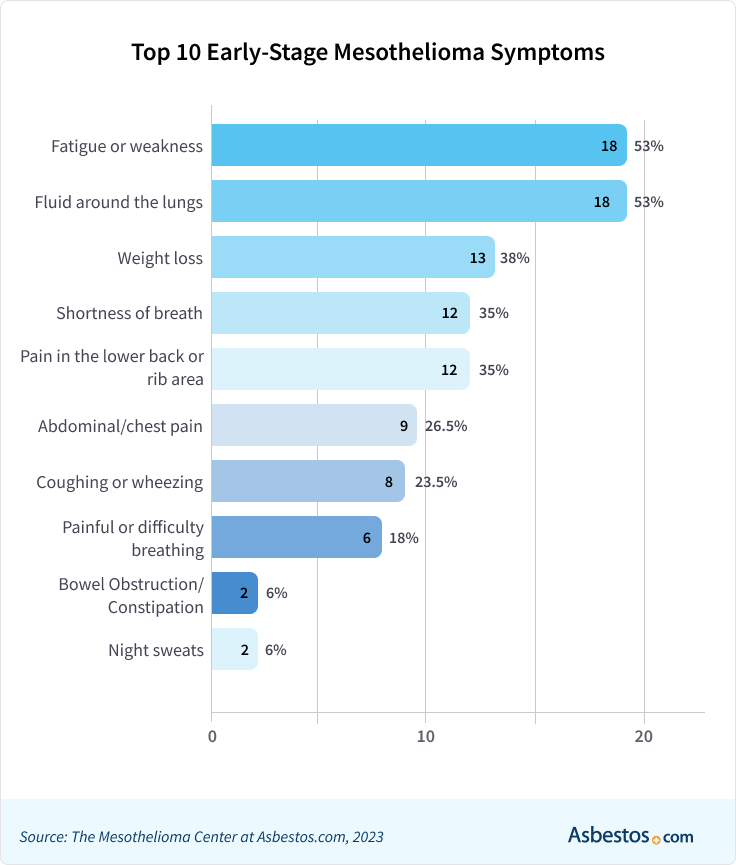
Identifying signs of mesothelioma early can help patients receive a diagnosis sooner, giving them more treatment options and improving their prognosis. Early-stage symptoms typically worsen as mesothelioma progresses.

The most common late-stage symptoms (stages 3 & 4) involve pain and difficulty breathing. This includes fatigue or weakness, shortness of breath, abdominal or chest pain, weight loss and pleural effusions in most patients.
Local and distant spread of mesothelioma to other organs, including the diaphragm, often causes late-stage symptoms. Many of these symptoms are systemic, affecting the whole body. This can indicate that cancer is affecting multiple organs throughout the body.
New or worsening symptoms can be a sign of disease progression. This can include metastasis to other parts of the body.
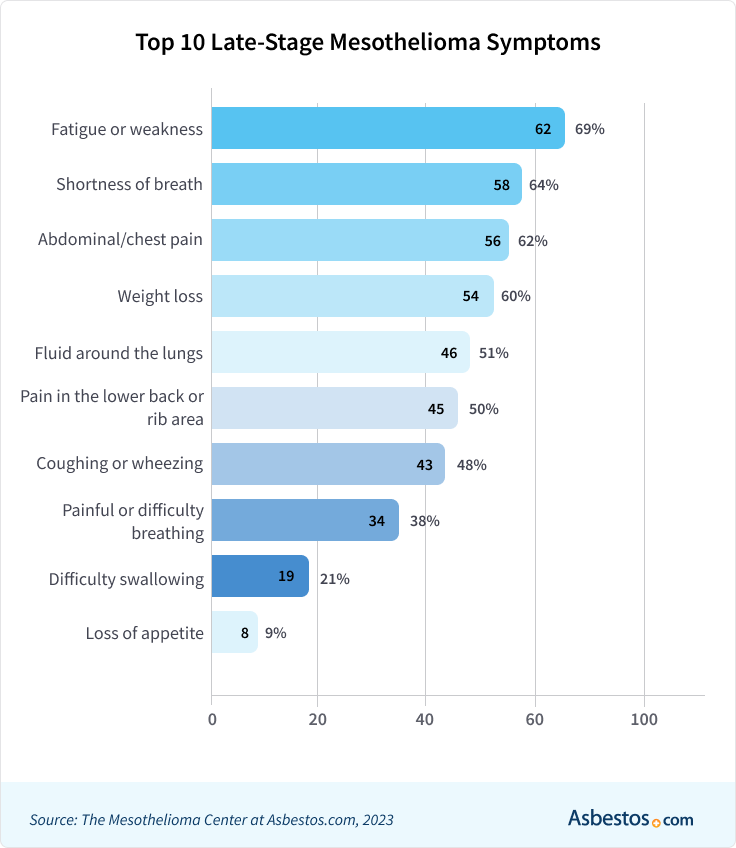
“Chest pain can indicate that the tumor has invaded the chest wall,” DaSilva told The Mesothelioma Center. He urges his patients not to ignore any of these symptoms.
See a doctor immediately if you have chest pain, abdominal pain or other symptoms. This is especially important if you have a history of asbestos exposure. Early detection of mesothelioma can improve treatment outcomes.
Raising awareness about mesothelioma signs and symptoms is critical in increasing early detection. Additionally, knowing asbestos is the primary cause of mesothelioma is particularly important for those who worked with the toxic mineral or asbestos products. These workers have a higher risk of mesothelioma.
If you recognize symptoms, make an appointment as soon as possible with a mesothelioma doctor or speak with your general practitioner. Early treatment is more effective in slowing your cancer and improving your survival.
Mesothelioma symptom management can include palliative therapies to help reduce pain and increase comfort, as well as traditional treatment options for cancer. Supportive therapies can also help patients and families cope with mesothelioma’s emotional and psychological effects.
Surgery, chemotherapy, immunotherapy, radiation and targeted or gene therapy can remove or reduce tumors that cause mesothelioma symptoms, offering patients relief. However, these treatments can also cause side effects and some can have challenging recoveries. Many patients worry treatment effects may be as bad or worse than their current symptoms and are concerned about how these effects may limit their daily activities.
When mesothelioma survivors speak with me, they ask about treatments to manage their symptoms and what their quality of life will be like after treatment. They ask me, ‘Will it make me sicker than I’m already feeling at this moment?’ and ‘Is it worth going through it?’
A good symptom management plan, including pain management, takes your health and specific symptoms into account. Nutrition, exercise and mental health support are all important parts of treating mesothelioma symptoms.
Traditional approaches such as respiratory therapy, physical and occupational therapy and pain medication are sometimes combined with complementary therapies such as massage, gentle yoga or meditation. Support groups can help patients manage emotional aspects of their mesothelioma symptoms and share personal insights into approaches that work for them.

Mesothelioma symptoms tend to present between 20 and 60 years after asbestos exposure. This delay is known as the latency period. The signs also mimic many common diseases. These factors make a mesothelioma diagnosis challenging for unspecialized doctors.
Yes, you may have mesothelioma without any symptoms. Many mesothelioma symptoms are mild and mimic the flu or a stomach virus. Most only appear decades after asbestos exposure. Doctors may also misdiagnose this rare cancer as other illnesses, delaying your mesothelioma diagnosis.
Yes, some mesothelioma symptoms may occur suddenly. Some patients do not experience symptoms until the cancer has spread to another organ, such as the kidneys or liver. The cancer location determines the type and severity of symptoms you may have.

Have a question? Contact one of our Patient Advocates and get the answers you need.

Connect, share stories and learn from the experiences of others coping with mesothelioma in one of our support groups.

We help support charities, hospitals and awareness groups working to help people impacted by asbestos and cancer.
Your web browser is no longer supported by Microsoft. Update your browser for more security, speed and compatibility.
If you are looking for mesothelioma support, please contact our Patient Advocates at (855) 404-4592
